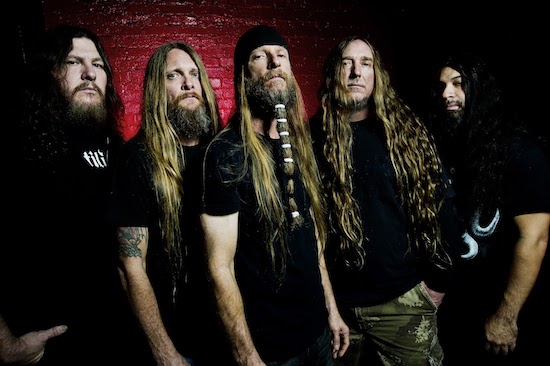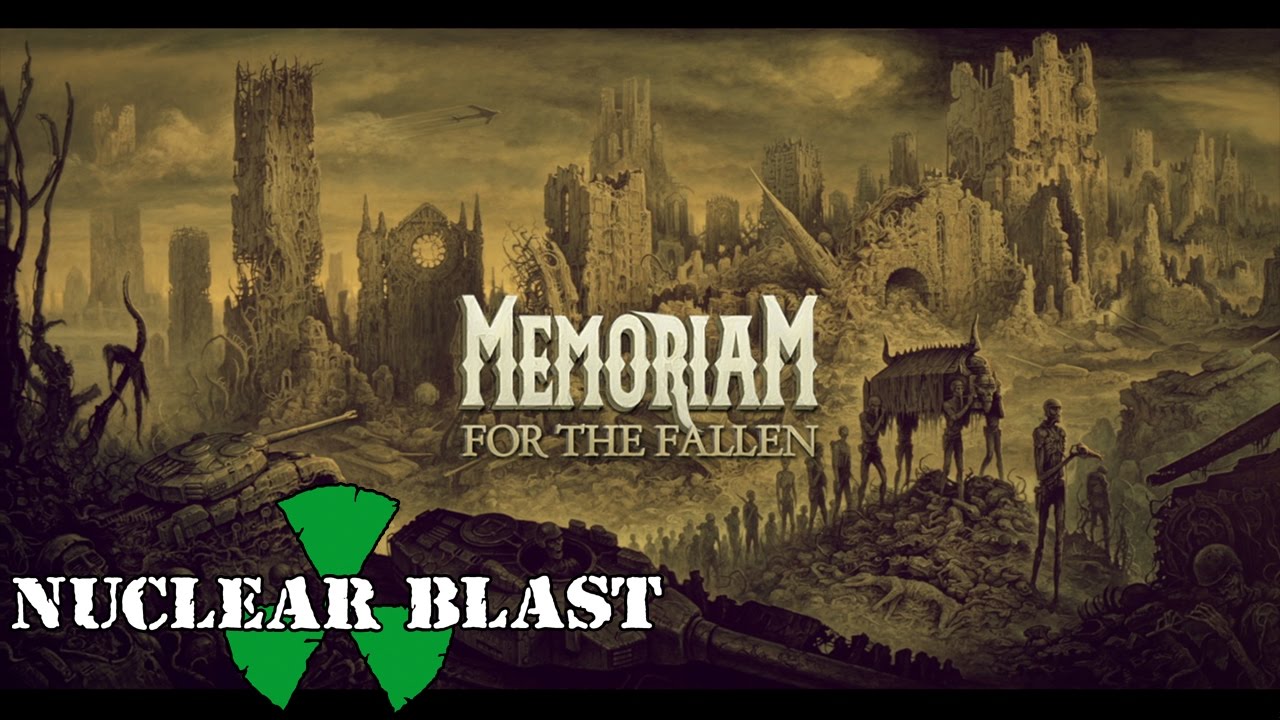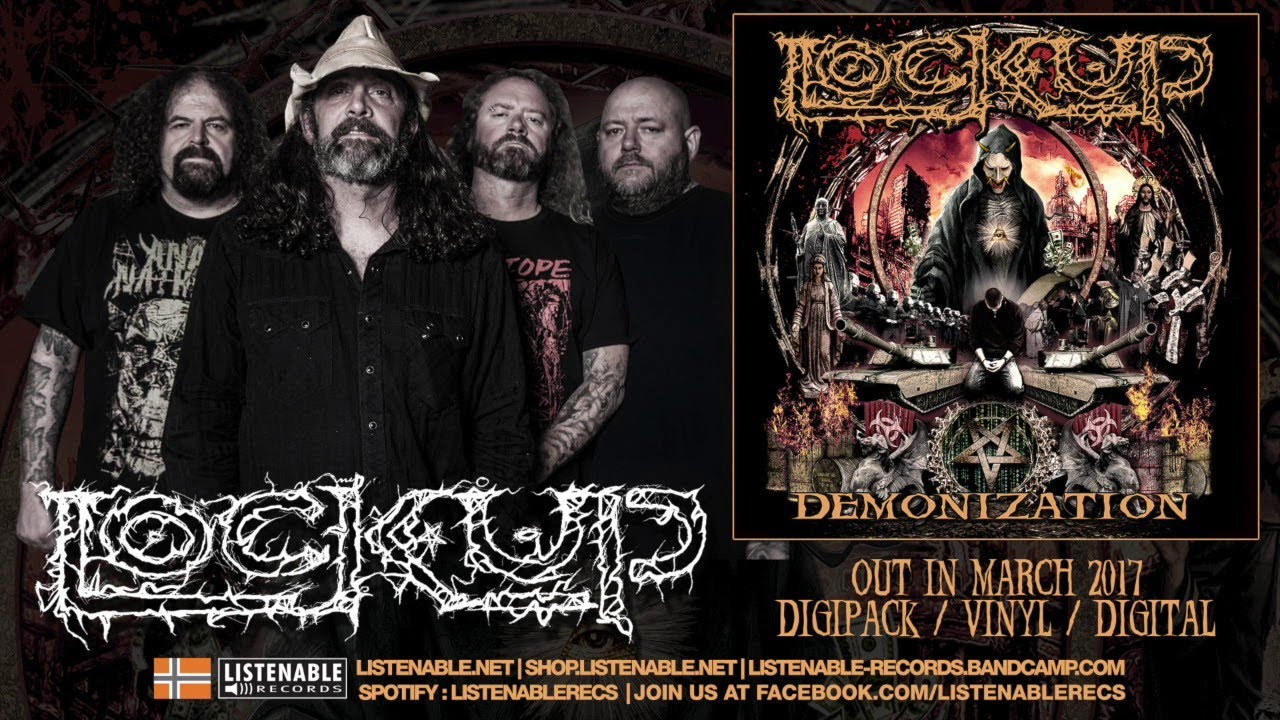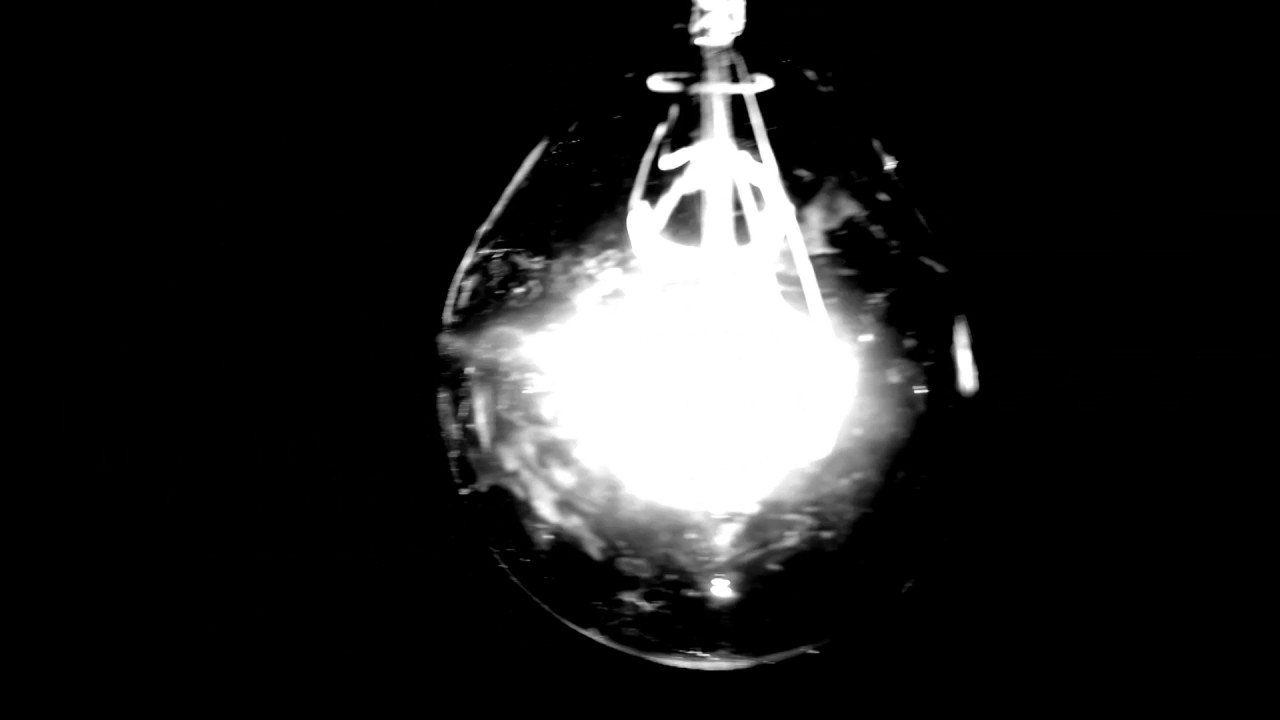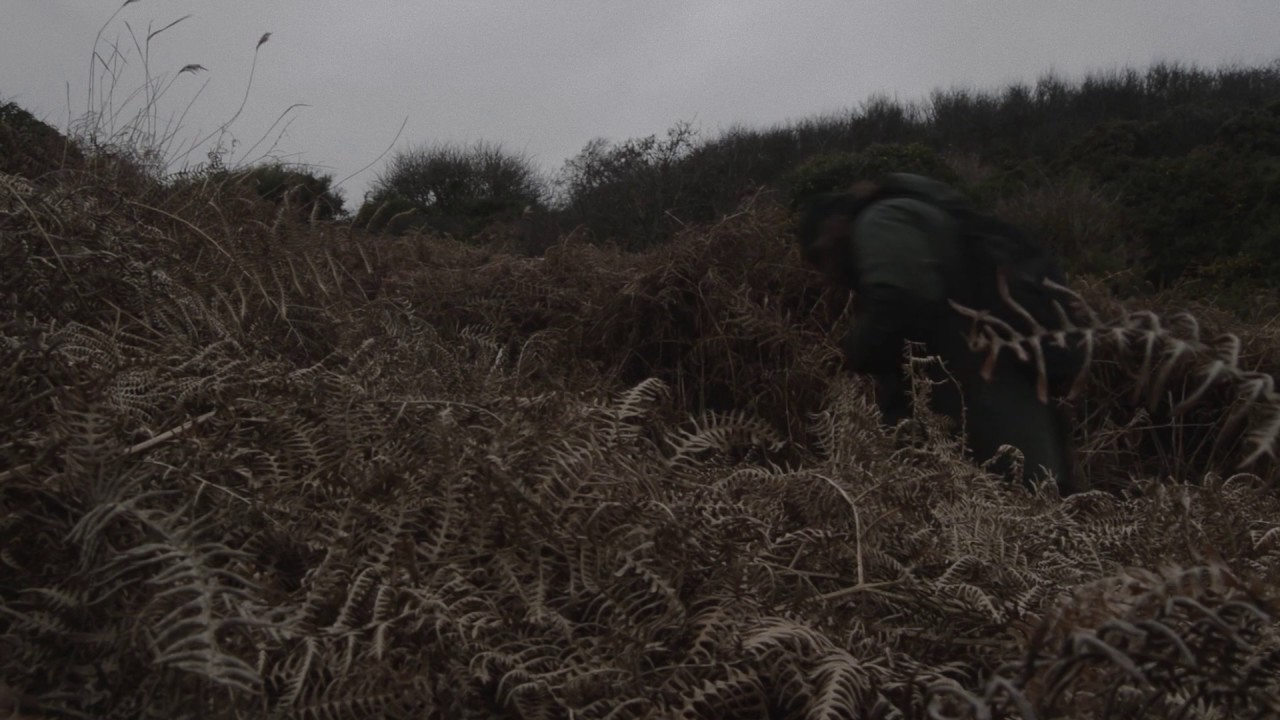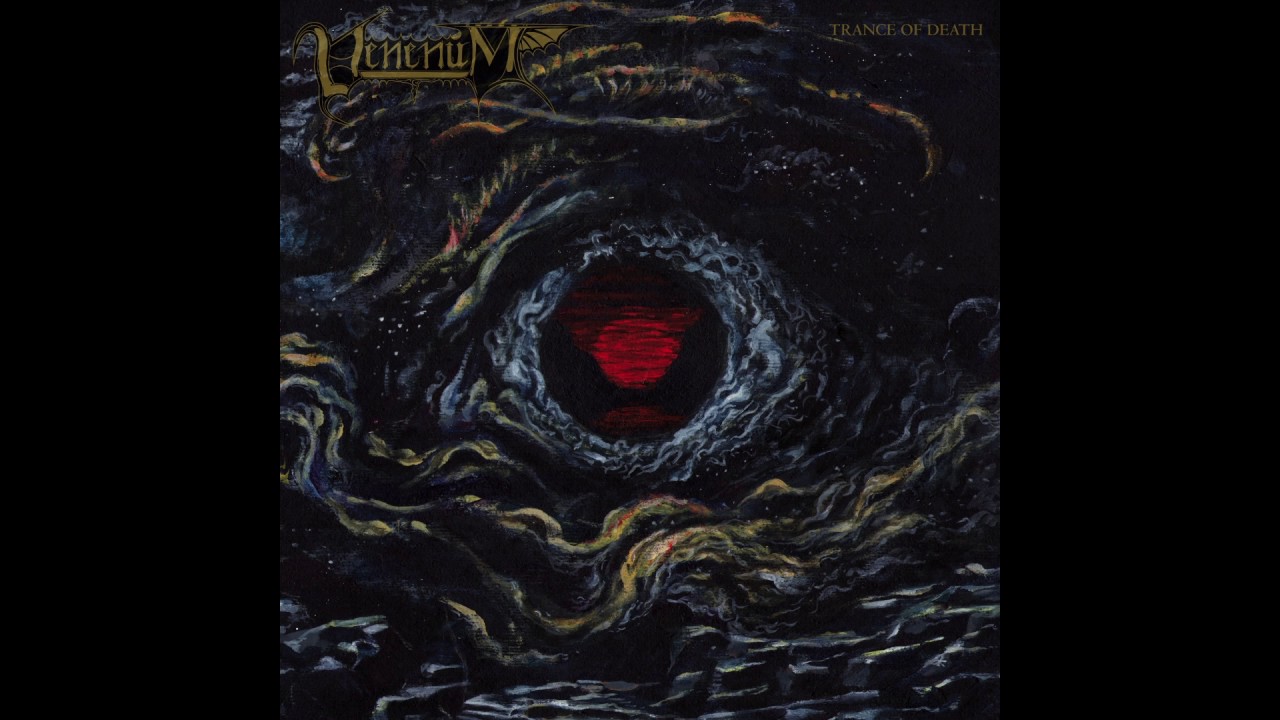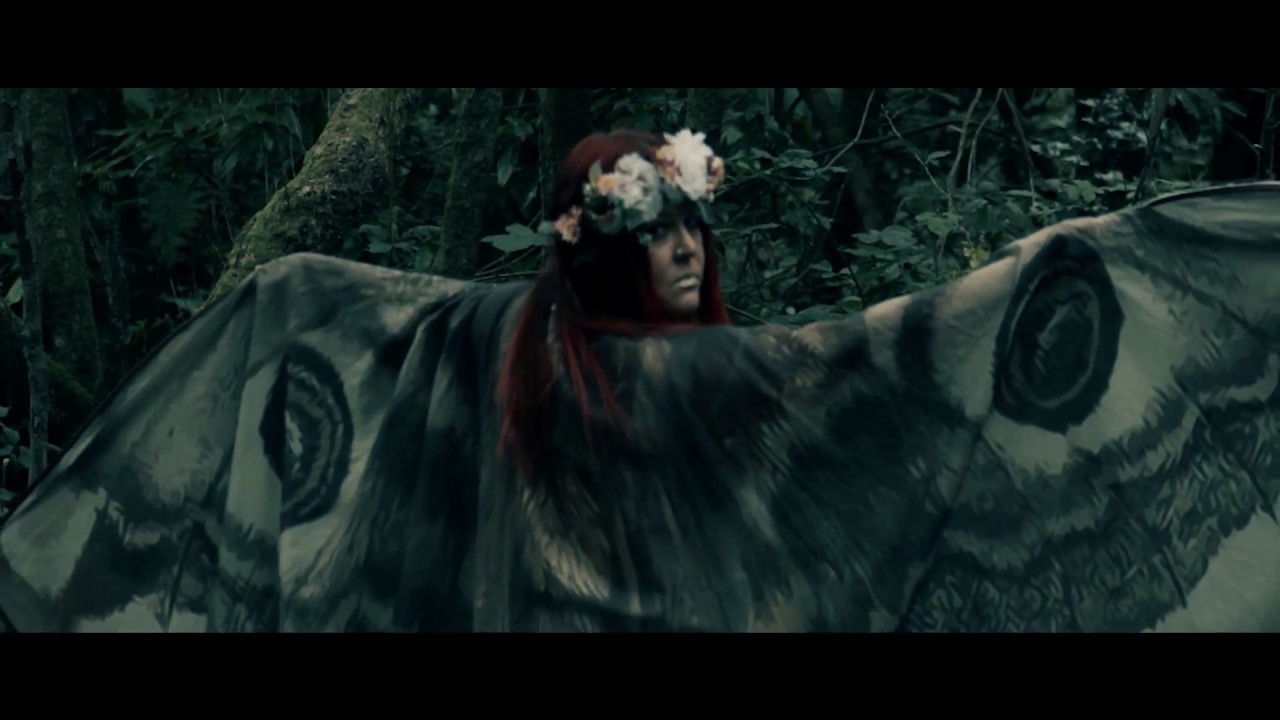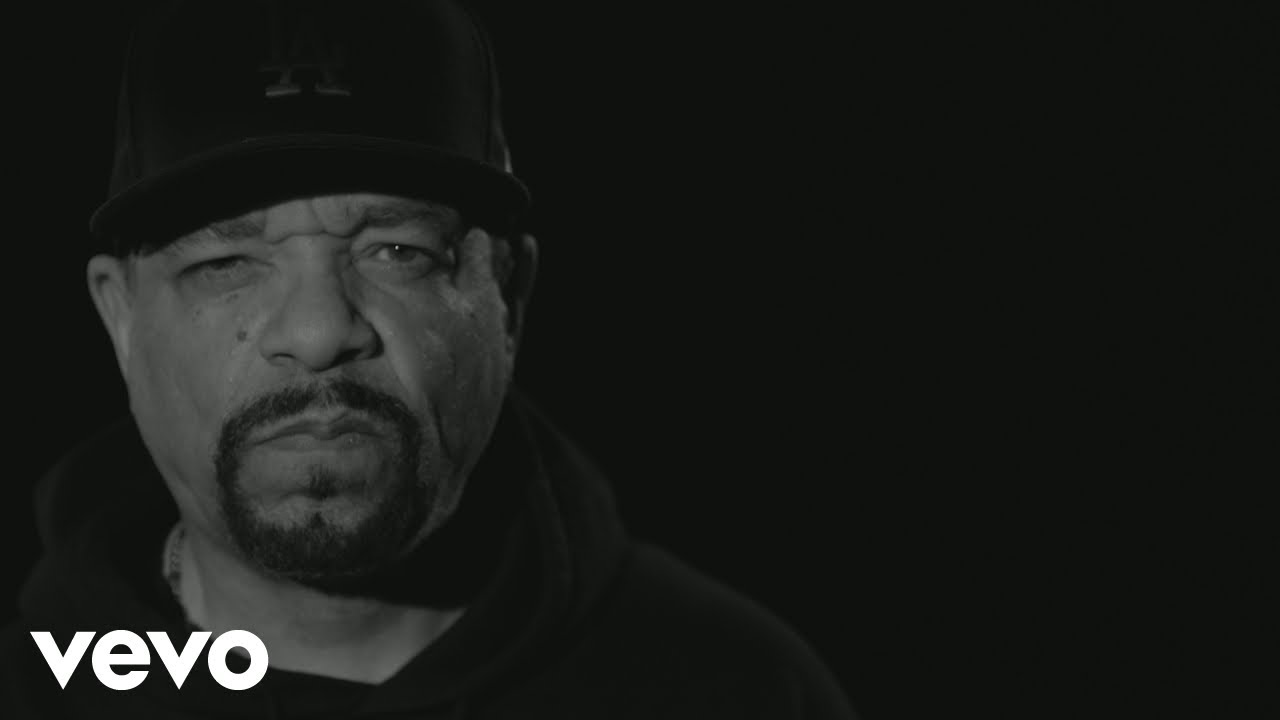Obituary portrait by Ester Segarra
As 2017 hurtles kicking and screaming into March, that soothing post-Christmas malaise feels like it was aeons ago. The pressures of the modern world seem to mount every day, and whilst metal has always provided a healthy respite from the drudgery of current affairs and looming apocalypse, the sheer amount of new metal albums being churned out daily can be pretty overwhelming. Contrary to what some clickbait articles would have you believe, metal as a genre in is seriously rude health these days; the floodgates are well and truly open, and it can be difficult for the obsessive music fan to keep up, let alone the nerds who scrape a living by documenting all this stuff.
Of course, writing about music is a ridiculous, bizarre privilege, but in this hyper-fast, overstimulated world, it can also sometimes feel a bit like Homer’s visit to Hell’s Ironic Punishment Division on that old Halloween episode of The Simpsons: “So you like metal, eh? Well, have all the metal in the world!” And so you eagerly gulp it all down, feasting like a famished boar until you find yourself alone and bleary-eyed on a Friday night, staring at a blank Word document whilst desperately trying to articulate your opinion on songs with titles like ‘Slurping Reeking Slime’ before delving back into your inbox to disappoint the hordes of terrifyingly efficient PR folk who are eager to get your thoughts on their latest batch of fresh-faced metalcore also-rans, and you begin to seriously question your life decisions. You could have been a doctor, you know. Or an astronaut. Probably…
Thankfully, such thoughts are fleeting when you allow yourself to sit back and remember just how much great metal is being created at the moment. For this month’s bumper edition of Columnus Metallicus, I’ve chopped March’s releases back to a whopping 18 albums that I think are worthy of your precious time, and I’ve undoubtedly missed out on some gems too. April shows no signs of letting up either, with new albums from the likes of The Obsessed, Coltsblood, Crypt Rot, Artificial Brain, Fuoco Fatuo and Widows already finding themselves in heavy rotation on my stereo. But hey, we’re already getting ahead of ourselves; it’s time to face March head-on and take some cues from Homer’s inspiringly bottomless appetite, so strap on your feedbags, metal geeks, and let’s gorge on riffs ‘til we burst. Horns up!
Pallbearer – Heartless
(Nuclear Blast / Profound Lore)
It’s been great to watch Pallbearer’s ascension from underground darlings to universally acclaimed doom saviours, as the Arkansas quartet are one of those rare bands that entirely justifies the feverish hype surrounding them. 2012’s Sorrow And Extinction was one of the best doom albums of the last decade, taking the heaviness and grandiosity of bands like Black Sabbath, Warning and Candlemass and adding an atmosphere and penchant for progressive, narrative-led song-writing that was all their own. It was an album that stayed true to traditional doom metal’s roots, whilst still pushing the genre forward into daring new territories, and, true to form, Pallbearer have continued to expand and experiment with their sound ever since. 2014’s follow-up Foundations Of Burden was a very different beast, drawing on what made their debut so compelling and affecting whilst delving down an even proggier route, and Heartless very much continues in that direction, to that point that it’s tempting to view Foundations as something of a stepping stone between the first album’s sound and this one.
Opting to work with Joe Barresi (The Melvins, Tool, Queens Of The Stone Age, etc) for Heartless has resulted in a warm but curiously thin guitar tone compared to their previous work, noticeably lacking the same visceral impact of Sorrow, although this actually benefits the album in other ways and makes sense given how the band’s sound has evolved. Pallbearer’s music now soars where it would have crushed, uplifts where it would have flattened, and whilst Heartless’s crisp, clear and airy sound may come at the expense of that physical heaviness, it allows the numerous intricacies in these songs to shine through – and this album is definitely their most ambitious so far on the song-writing front. The first half of the album contains some of their punchiest, most direct songs so far, with ‘I Saw The End’ and lead single ‘Thorns’ especially offering up twisting, labyrinthine riffs and stirring, emotionally charged climaxes in much more compact structures than we’ve come to expect from the band.
The second half sees Pallbearer pushing themselves even further, with forlorn twelve-minute centrepiece ‘Dancing In Madness’ recalling Pink Floyd in more ways than one, as a gorgeous Gilmour-esque solo gives way to the kind of wonky, psychotically tinged vocal melody you’d expect from their early Syd Barrett days. ‘Cruel Road’ then picks up the pace, with its driving bravado and triumphant falsetto recalling the grand bluster of Defenders Of The Faith-era Judas Priest. Indeed, Heartless features some of frontman Brett Campbell’s most extravagant and expressive vocal melodies yet, dancing elegantly (and even playfully at times) across these poignant compositions. Whilst the comparison to Warning/40 Watt Sun’s Patrick Walker is still an obvious one (especially during heart-breaking closer ‘A Plea For Understanding’), hopefully this will be the album that cements him as one of metal’s most unique, creative and talented vocalists in his own right. Moreover, as the band continue to challenge themselves and deliver such detailed, touching and exquisitely written songs, hopefully Heartless as a whole will see Pallbearer recognised not just as one of the most interesting doom bands around, but one of the most interesting rock bands around full stop.
Memoriam – For The Fallen
(Nuclear Blast)
The death of drummer Martin “Kiddie” Kearns in 2015 was a crippling blow for death metal fans, especially as it spelt the definitive end of Bolt Thrower. Sure, they hadn’t issued a studio album in well over a decade, but as their recent appearance at Damnation Festival proved, they were still an unbelievably vicious live band, and despite stating that 2005’s Those Once Loyal would be their final LP, that didn’t stop many of us still clinging on to the hope that they’d come around to the idea of pumping out a new one eventually. But then came the day we hoped would never happen, and on September 14, 2016, one of Britain’s most enduring, influential and downright powerful metal institutions announced that they had finally thrown their last bolt.
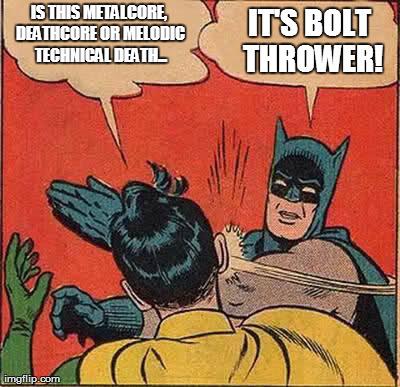
The upside of all this tragedy, however, is that Bolt Thrower’s break up seems to have galvanized vocalist Karl Willetts into writing new music again. Joined by previous Bolt Thrower drummer Andrew Whale and Benediction members Frank Healy and Scott Fairfax, Memoriam have been teasing us with a couple of seven inch demos before finally unveiling this suitably beefy full-length. The result is pretty much exactly as you would expect, with gargantuan grooves and rumbling tremolo riffs colliding with Karl’s hoarse, leathery bellow in a manner that just screams, “It’s Bolt Thrower!" It feels good to hear his distinctively Brummie bark back in action again, and whilst the shadow of their other bands looms heavily over this opus, you can definitely hear these veterans having fun playing around within this style.
Check out the brash, staccato chugging and squealing pinch harmonics of absurdly catchy intro ‘Memoriam’ for example, or the furious crust punk vibes of ‘Corrupted System’, recalling Doom in their heyday before ditching the D-beats for an altogether deathlier onslaught in its second half. ‘Last Words’ is a pretty epic closer too, dishing out the kind of heroic, swinging guitar harmonies that typified later Bolt Thrower records before breaking into an almost Swe-death sounding barrage.
Truth be told though, there are no real surprises on For The Fallen (save for ‘Corrupted System’s quasi-industrial ‘Multinational Corporations’ style outro, perhaps), but then, there doesn’t really need to be. It doesn’t take a genius to figure out what the sum of Bolt Thrower + Benediction is going to sound like, and this album is just as heavy, satisfying and bullshit-free as you’re currently imagining it to be. Whilst there’s enough fresh ideas here to make Memoriam feel like a distinct band in their own right rather than just Bolt Thrower mk.2, for those loyal fans who have been waiting patiently since 2005 for a follow-up to Those Once Loyal, this is certainly a worthy successor.
Obituary – Obituary
(Relapse)
Dropping a self-titled album decades into your career is a bold move, and usually says one of two things; 1, this is the most fully realised and definitive version of our sound yet, or 2, our collective idea well has now run so dry that we can’t even find the energy to muster up a title anymore. Thankfully, Florida’s death metal darlings are aiming for the former here, and though admittedly it would be a stretch to call this the quintessential Obituary album, rest assured it does not fuck about in the slightest.
You’d be forgiven for assuming the worst after 2014’s Inked In Blood, though; not that the band’s ninth album was terrible by any stretch of the imagination, but the fire that burned at the heart of their classics had definitely dimmed, with it just feeling like another OK Obituary album in a succession of OK Obituary albums. This one, however, is an absolute animal.
‘Brave’ sets the tone instantly: no atmospheric, drawn out intros, no torturous build-up, just the kind of fuck-off great riff that’ll make you want to crush a beer can against your forehead and cruise around the swamps of Florida firing a shotgun into the air. New lead guitarist Kenny Andrews has really come into his own here, with some truly killer leads, venturing into prime Andy LaRocque territory on ‘Sentence Day’ especially. Much like the songs themselves, the solos are fairly short, sharp and to-the-point, accentuating the buoyant groove of songs like ‘Lesson In Vengeance’ and lurking just beneath the thunderous double-kick battery of ‘Kneel Before Me’. The riffs keep coming thick and fast, with songs like ‘Straight To Hell’ alternating between Tom G. Warrior stomp, hardcore swagger and lurching doom in the way only Obituary can.
Sure, there’s the odd sign of wear and tear here and there – John Tardy’s voice sounds fairly blown out compared to earlier records for instance, though that’s hardly surprising given how many years he’s spent screaming “choopppped in heeeeeuurrrrghhhaaaalf!” – but honestly, I’d have no qualms in saying this is the best of Obituary’s post-2003 reunion albums. There’s no dead weight on Obituary whatsoever – this is a snarling, hungry and ferocious blast of classic sounding death metal that’s fully deserving of the self-titled status.
Unearthly Trance – Stalking The Ghost
(Relapse)
It’s easy to be cynical of band reunions in this day and age, but as anyone who caught Unearthly Trance’s incendiary performance at Desertfest last year will attest, this is the real deal; and if you missed out on that one, then the minute ‘Into The Spiral’s reassuringly pulverising Celtic Frost-meets-Neurosis girth comes tearing out of your speakers should be all the convincing you need. Yes, New York’s most angular doom trio are back, and it sounds like they’ve never been away. Of course, they’ve all been keeping busy with other projects like Serpentine Path, Thralldom and The Howling Wind (to name but a few), but it’s still impressive quite how naturally and easily they seem to have slipped back into Unearthly Trance mode after such a long break from the project, with their distinctive sound positively leaping out of this sixth LP. Forgoing the loftier ambitions of 2010’s (at the time) finale V, Stalking The Ghost is a righteously raw record, returning to the initial core of the band’s style, sounding for all intents and purposes like three dudes just jamming in a room, with very little in the way of overdubs. These songs still twist and turn in that predictably unpredictable manner they’ve always excelled at, but with an immediacy and venom that comes from that live energy – though don’t fret, rehearsal-tape-ophobes, the actual production itself is thick, booming and deliciously heavy.
Guitarist Ryan Lipynsky’s voice is sounding better than ever too, with his savage, gargling screams dominating the bitter, lysergic ‘Scythe’ and his rousing, full throated clean vocals adding bags of swaggering energy to ‘Dream State Arsenal’s stuttering Godflesh-ian riffs and the soaring, bombastic ‘The Great Cauldron’. Elsewhere, ‘Lion Strength’ sees them experimenting with dynamics, dropping down to a barely audible whisper before building back up to a threatening, speaker blowing roar, whilst ‘Famine’ delivers heroic up-tempo chugging and ‘Invisible Butchery’ drops down into desolate death/doom depths, Winter style. It’s a varied, engaging and riff-centric record, and just a fucking great Unearthly Trance record all round, really. My one criticism would be that the droney, ambient outro ‘In The Forest’s Keep’ feels a bit unnecessary given that penultimate track ‘The Great Cauldron’ works as such a strong closer, but in all honesty, that’s kind of like moaning when presented with a plate full of Ferrero Rocher after finishing a particularly succulent steak. We’ve waited seven years for this after all, so just shut up and chow down.
Cryptic Brood – Brain Eater
(Xtreem)
Speaking of “three dudes just jamming in a room”, that’s exactly what Cryptic Brood’s debut sounds like too, with the German trio apparently having recorded it in their practice space. With a fervent yet distinctly unrefined quality, the band’s rough, Autopsy-indebted churn encompasses sickeningly heavy doom sections, punk-as-fuck D-beats and the fetid stench of vintage death metal, all neatly demonstrated in barn-storming opener ‘A Box Full Of Bones’. They’ve also got the whole dual vocal thing going on too, which they do very well, paring ultra-guttural rhinoceros snores against a more high-pitched, peril-filled shriek, similar to Noothgrush in places – especially on the awesome ‘Maggot-Infested Flesh’, a malevolent two-minute doom-a-thon that heavily recalls the Oakland sludge pioneers’ misanthropic anthem ‘Useless’, before unexpectedly erupting into a burst of rancid grindcore fury during its last few seconds.
The overall vibe, production and atmosphere is very similar to Swallowed’s first two demos, but whilst that Finnish three-piece had advanced towards a hallucinatory and thoroughly bizarre new realm by the time they issued their debut album, even after a demo, EP and handful of splits, Cryptic Brood are still very much in hero worship mode for this first full-length – although, when they’re aping Chris Reifert and chums with this much piss and vinegar, it’s hard to hold that against them. If you’re looking for progression, originality and innovation, there’s nothing for you here; if, on the other hand, you’ve worn out your copy of Mental Funeral and just want to be slapped about the head for half an hour by some raw, crusty death metal that doesn’t seem to have bathed, let alone checked out any new music, since the mid ’90s, then this is ideal.
Lock Up – Demonization
(Listenable)
As the ancient scriptures once foretold, once every few years when the stars and moon align in the correct manner, grindin’ supergroup Lock Up will bless us with another album – or, when their incredibly busy members are able to take time out from their other projects, if you don’t go in for any of that pseudo-mystical nonsense. The band’s line-up has undergone a few significant changes over time, and whilst any metalhead worth their salt will already know and love these guys, here’s a quick recap for those of you who have stumbled in here by mistake whilst looking for the deep house column; the core of the band is comprised of Napalm Death bassist and extreme metal renaissance man Shane Embury and drummer Nicholas Barker, who has played with everyone from Dimmu Borgir and Cradle Of Filth to Possessed and Sadistic Intent. Guitars were originally handled by Terrorizer’s Jesse Pintado, but since his passing in 2006 the torch has been passed to the capable hands of Pentagram Chile’s Anton Reisenegger, who adds even more of a death metal flavour to the band’s grinding output, especially here on songs like ‘Instruments Of Armageddon’ and merciless opener ‘Blood And Emptiness’.
Of course, the big news this time round, is that, after the departure of previous vocalists Peter Tägtgren (Hypocrisy) and Tomas Lindberg (At The Gates), this album is their first with former Brutal Truth man Kevin Sharp wielding the mic – and what a joy it is to hear his iconic, primal roar atop this particular racket. Lock Up’s sound is more straightforward and less experimental than Brutal Truth’s, and much more metal orientated than his other punkier projects like Venomous Concept and Primate, but Kevin feels right at home here, barking out lyrics with a downright feral intensity and matching the band’s blistering speed on tracks like ‘Sunk’. Demonization doesn’t really let up at all for its duration, with every one of Barker’s lightspeed fills across ridiculously highly tuned toms making your brain feel like it’s turning inside out. When the pace does slow, it’s all the more satisfying, with the ominous title track and the furious groove that permeates ‘The Plague That Stalks The Darkness’ guaranteed to get you head banging like an epileptic chimp.
This band have always been one of those rare supergroups that feel like more than the sum of their parts, but Demonization is arguably the most savage, relentless blast of nastiness to be released under the Lock Up name yet. Now we just have to pray the planets shift in such a manner that these four will be able to find the time to tour this thing…
Dread Sovereign – For Doom The Bell Tolls
(Ván)
MF Doom may have beaten Dublin’s gloomiest to that particular pun back in a line from 2003’s ‘Bells Of Doom’, but it’s still kind of surprising that it took until 2017 before a doom band claimed it as an album title. That’s not the only surprise that For Doom The Bell Tolls has in store either, delving into markedly more space rock-esque dimensions than their misery encrusted 2014 debut All Hell’s Martyrs, with ‘This World Is Doomed’ veering between molasses thick riffs and cosmically inclined solos backed by an almost motorik style beat, before ‘The Spines Of Saturn’ drops all pretences and just sets the controls for the heart of Hawkwind, complete with distant droning vocals, sparkling reverb-drenched leads and expansive synth swells, building to a satisfyingly psychedelic climax.
That’s not to say the album as a whole is on some full-on, acid fried tie-dye tangent, however, as the towering thirteen minute ‘Twelve Bells Toll In Salem’ is a bona-fide trad doom epic. The song’s structure and Alan “Nemtheanga” Averill’s soaring vocals bring to mind the likes of Candlemass or Solitude Aeturnus, but the Primordial frontman’s relative inexperience as a bass player (by his own admission) adds a certain rough-around-the-edges punk aesthetic and earthy charm to the proceedings. Don’t get me wrong, the bass doesn’t sound bad – the tone is nice and deep with a decent amount of grit to it, and it has a suitably hefty presence – but Dread Sovereign’s overall sound is much rawer than the more polished style of the bands they take their cues from, and is all the more thrilling for it.
At a relatively brisk 36 minutes – almost ten of which are taken up by the atmospheric intro and interlude, plus an admittedly awesome cover of Venom’s ‘Live Like An Angel, Die Like A Devil’ tacked on the end – For Doom The Bell Tolls feels more like an EP compared to their dense, hour-plus debut, but given that its highs are resplendent enough to warrant return trips, it’s worth seeking out nonetheless.
Aluk Todolo –Archives Vol. 1
(Temple Of Torturous)
For the experienced psychonaut who’s after something even headier and more immersive however, this, my friend, is the good shit. France’s Aluk Todolo are arguably one of the most genuinely psychedelic sounding bands of recent years, allowing their music to branch out into surreal and uncharted directions in an organic and seriously disorientating manner, rather than just trading off tired ’70s rock clichés – they’re the brown acid to Tame Impala’s poorly rolled soap bar joint, in other words, drawing elements of krautrock and black metal into a shifting morass that doesn’t really sound like either, and resulting in mind-expanding masterpieces like 2012’s sprawling, exploratory Occult Rock.
As the name suggests, this particular release collects all manner of rare, unheard material from the trio’s first decade of existence. B-sides and rarities collections like this can often be a mixed bag, and sure enough, the tracks here vary quite wildly in terms of sound quality, but Aluk Todolo have used this to their strength, fading these pieces in and out of one another and weaving them together quite masterfully in a way that recalls Faust’s classic stream-of-consciousness mind-bender The Faust Tapes more than it does another hastily assembled odds ’n’ sods compilation. Side A, for example, begins with the rotund rhythmic clout of the nine minute ‘IV XII MMX’ (sounding a lot like a more evil, malevolent incarnation of Can), drops into much scratchier, live sounding tracks like the curiously tender ‘XVIII I MMVI’ and then fades that into the bracing, distorted noise experiments of ‘XV V MMVIII’. Side B opens with one of their gentlest soundscapes, before breaking out some mid-tempo blastbeats in ‘XXVII XI MMIV’ and culminating in the rigid, industrial screech of the Psychic TV-esque ‘X IX MMVIII’. A testament to just how much great music seems to flow through these three individuals, Archives Vol. 1 is perfect for both the obsessive fan who wants to chart and observe the band’s evolution, and those who just want to get loaded, chuck something mind-altering on the turntable and spend the next 40 minutes gazing into the face of their chosen god.
Telepathy –Tempest
(Golden Antenna)
The distance between Aluk Todolo and the metal world at large becomes quite apparent when you realise that, despite being around for a decade and never, ever featuring vocals, they’ve never been saddled with the catch-all “instrumental metal” tag, whilst a band like Telepathy have had to put up with it since their first EP back in 2011. Yeah, OK, the phrase obviously serves a purpose descriptively speaking, but it’s pretty redundant when applied as a genre, isn’t it? I’m looking at you, dullards who say things like, “Oh, I could never get into instrumental metal” as if the minute you strip vocals away, bands as disparate as Bongripper, Blotted Science and Russian Circles all boil down to the same amorphous and vaguely defined mush. Anyway, those people should be able to look beyond the absence of someone screaming themselves silly on Telepathy’s second album Tempest, partly because it’s such a dynamic, expressive and engaging piece of music that it stretches far beyond the “instrumental metal” tag, and partly because – surprise! – one track does have someone screaming themselves silly after all. See, there’s something for everyone!
Whilst the band’s debut album 12 Areas was an invigorating collection of the kind of weird time signatures and frantic, off-kilter riffing that often gets referred to as “math metal”, Tempest feels more spacious, atmospheric, dynamic and mature. Not that it doesn’t have its chaotic moments – check out the flurry of blastbeats that spring out of nowhere to punctuate the twinkling leads and disgustingly hench riffs in the climax of ‘Celebration Of Decay’, or the furious post-black metal whirlwind and intricate drum patterns of ‘Apparition’ – but for the most part, Tempest’s scope and emotional depth is far wider than its predecessor, with songs like ‘Smoke From Distant Fires’ and ‘Water Divides The Tide’ fusing cathartic metal riffing with the kind of stirring, well-paced crescendos that would have Explosions In The Sky nodding their heads in approval.
Apparently, Tempest is a bit of a concept album too, telling the tale of a person battling with grief and total isolation after a great flood, taking the listener “through awakening, desolation and finally acceptance.” Though you probably wouldn’t have picked up on the nautical theme from the first listen, it’s amazing how the band are able to convey the feeling of the narrative without literally spelling it out; when the previously mentioned screams do crop up in ‘Echo Of Souls’, they’re used more as a textural element, hammering home the harrowing force of the song’s weighty detuned chords before lapsing into plaintive, forlorn strumming. By the time the frankly beautiful ‘Hiraeth’ rolls around, you can definitely feel desolation and acceptance grappling with each other as giant Isis style grooves break into squealing melancholic leads. Indeed, the leads are awesome throughout Tempest – emotive, played with conviction and backed by such a deliciously crisp, shining tone, they’ll make you wonder why you even missed vocals in the first place.
Planning For Burial –Below The House
(The Flenser)
Singer/songwriter Thom Wasluck’s Planning For Burial project is another one of those bands that’s not strictly metal per se, but is dark, heavy and morose enough to appeal to all you riff-hungry fiends who have made it this far through this column. It helps that Below The House, his third full-length, opens with his most overtly metallic song to date, as ‘Whiskey And Wine’ finds Wasluck unleashing a harrowing screech atop the kind of lumbering, mournful riffs your local funeral doom band would kill for. The album seems to gradually wind down after this explosive intro however, becoming more introspective and introverted as it progresses, culminating in the achingly sombre Low-esque vistas of sixteen-minute-plus two-parter ‘Dull Knife’ and the delicate, distant bass rumbles of the brief but heartfelt title track.
The journey between these two points amounts to Wasluck’s most diverse album yet, bringing together a great deal of his influences into a gloriously gloomy quagmire. ‘Threadbare’ reeks of Mogwai’s ‘R U Still In 2 It’ with Thom’s distant, reverb smothered croon gliding across sparse chords and jarring static, ‘Somewhere In The Evening’ sounds like the Red House Painters playing through Electric Wizard’s backline, and ‘Warmth Of You’ marries Burzum-ic synths to a moody Joy Division style back bone. Below The House never feels anything less than cohesive though; the common thread (as you may have guessed from those comparisons) is the overriding sense of sadness, melancholy and despair that just oozes out of this record, binding all these seemingly disparate elements together like some kind of moribund yet particularly effective adhesive. Much like his other records, there’s a very lo-fi, almost homemade feel to this album, with a few odd sonic choices as sounds bleed into one another, cut out in unexpected places or shroud certain songs (like the droning ‘Past Lives’) in a near impenetrable auditory swamp. Whilst some may find that off-putting, it fits the project’s sound very well, and adds to the tangible feeling of isolation here too. This isn’t music made by a group of friends over a few beers on some sunny afternoon; this is music made alone in a darkened room during the wee hours of the morning when that familiar feeling of existential dread is at its most potent, and should be listened to under similar conditions for maximum impact.
Black Cilice –Banished From Time
(Iron Bonehead)
If you weren’t put off by that lo-fi sound, then get yourself acquainted with Portugal’s finest solo black metal outfit, Black Cilice. The mysterious figure behind the project has been releasing a steady tide of murky, fuzz-laden smog since 2009, becoming increasingly more refined and atmospheric without ever sacrificing any of that sinister tape-deck hiss. Banished From Time is the project’s fourth full-length, following 2015’s acclaimed Mysteries, and finds Black Cilice’s distinctive aura sounding more unique and well-realised than ever. As with all lo-fi black metal, it may owe a lot to Transylvanian Hunger both sonically and in terms of riffing style, but the song structures here are more elaborate, the sound itself is more layered and the vocals are more of a melancholic Urfaust-esque wail than the typical screech, but granted a healthy dose of harshness due to the primitive production and recording techniques anyway.
It’s not just for the black metal obsessives either; if you’ve always been intrigued by the concept of lo-fi black metal but have struggled to get into it previously, this could be a decent entry point. It’s nearly as raw and minimal as the classics, but with the kind of washed out, melodic pulse and wistful vocals that could definitely catch the ears of those who prefer old Spacemen 3 demos to, say, Ildjarn – the end of ‘Channelling Forgotten Elegies’ almost drops into a motorik groove before settling back into a brash Bathory stomp, for example, and ‘Boiling Corpses’ skips along with a post-punk-ish feel (well, amidst flurries of evil, frostbitten tremolo, of course). A gripping listen, both for black metal connoisseurs and lovers of strangely textured avant-garde music in general.
Fen –Winter
(Code666)
After making quite a splash with their second album, 2011’s Epoch, Fen were championed amongst a new vanguard of UK black metal acts like Winterfylleth and Wodensthrone, but whilst those two were often hailed as the UK’s answer to bands like Wolves In The Throne Room and Weakling, Fen were perhaps closer in sound to the softer, more melancholic strains of Agalloch. Fifth album Winter is a typically dense opus, consisting of six ten-minute-plus tracks, and for all it’s beautiful, windswept peaks, there are a few muddy troughs too.
Tracks like ‘IV (Interment)’ unfold patiently and gracefully for example, with the opening build-up and transition from sombre, folky swells to muscular Enslaved-esque gust allowed ample room to breathe, and delivering much more of an impact because of it; the transition through frostbitten blasts to a storming Hammerheart style conclusion being just as gratifying. But occasionally, as on ‘III (Fear)’, the trio can get bogged down amidst fairly generic black metal riffing, without attaining either the hypnotic pulse of peers like Agalloch and WITTR or the icy fury of a band like Mayhem or Emperor, leaving some of these passages to drift slightly instead of really going for the jugular. That’s not to say Fen flounder when they ramp up the intensity – ‘II (Penance)’, one of the more aggressive offerings here, conjures up a similar feeling to the first Altar Of Plagues album with its earthy, blackened riffery and is a definite highlight – but Winter is at its strongest when playing off the band’s progressive tendencies to produce rich, enveloping atmospheres, as on the labyrinthine ‘V (Death)’ and sumptuous Sigur Rós-meets-Drudkh finale ‘VI (Sight)’.
Winter doesn’t really break any new ground for the band, but still manages to sound fresh for the most part. If you prefer your black metal to be of the primitive, blasphemous variety, then this isn’t going to win you over, but fans of the genre’s more atmospheric, post-rock indebted mutations should find much to explore here.
Falls Of Rauros –Vigilance Perennial
(Bindrune)

Fen fanatics (Fen-atics?) shouldn’t pass up this slice of folky black metal either. The words “folk” and “metal” often have pretty negative connotations when combined, conjuring up images of poorly applied face paint and ill-advised accordion solos, but Portland’s Falls Of Rauros are the good kind; the kind that sounds a bit like the first Ulver album and puts out splits with Panopticon, a band with which they have definite similarities. Though their scope isn’t quite as epic or intense as Panopticon’s, they make up for it with an alluringly earthy, rustic sound and a slightly looser, more spontaneous feel, which is in full effect right from the beginning of album number four, Vigilance Perennial, as the smooth, jazzy swing of opener ‘White Granite’s intro attests.
There are some truly beautiful moments on this album, with ‘Arrow And Kiln’s yearning, acutely introspective guitar harmonies belted across a righteous mid-tempo gallop like a clinically depressed Iron Maiden and the swathes of stirring tremolo chiming out amidst ‘Labyrinth Unfolding Echoes’s gorgeous Bergtatt-esque climax being highlights on a record full of them – even the obligatory mid-album acoustic interlude ‘Warm Quiet Centuries Of Rain’ is a perfectly honed nugget of calming campfire ambience. These songs are strong enough to forgive the fairly flat, thin production, too, and yeah, I know, it feels weird to be criticising something like that after singing the praises of Black Cilice’s recorded-on-a-Fisher-Price-tape-deck sound mere paragraphs ago, but whilst the droning, hypnotic vibe of Banished From Time was suited to being shrouded in lo-fi mulch, Falls Of Rauros are much more dynamic in style, and sometimes it’s difficult not to feel like the heavier sections should have a bit more weight or bottom-end behind them. Still, that’s a fairly minor niggle on what is otherwise a meticulously well-crafted record – if you haven’t succumbed to Falls Of Rauros’ charms yet, then this is a fantastic introduction to the band.
Venenum –Trance Of Death
(Sepulchral Voice)
No production quibbles with this one whatsoever, though! This is one seriously satisfying slab of death metal goodness, with fat, meaty tones and a warm, organic feel. It’s heavy as fuck, but actually kind of surprising just how clear everything sounds on this album, given the altogether murkier sound of Venenum’s self-titled 2011 debut EP (which arrived just as bands like Grave Miasma, Cruciamentum and fellow Germans Beyond were blossoming and the so-called “new wave of old school death metal” had begun lapping against metal’s broad shores), not to mention the resolutely filthy sound of guitarist Patrick Tauch’s previous outfit, Excoriate. Unlike their contemporaries who delved into increasingly cavernous sounds, however, Venenum seemed to promptly disappear after the release of that EP, but this, their first full-length, makes up for the six year wait and then some.
The rich, full sound of Trance Of Death does not come at the expense of atmosphere or outright brutality though; if anything, it benefits from it, as smaller details like those overwhelmingly sinister bass fills at the end of ‘Merging Nebular Drapes’ or the blisteringly fast tom rolls in ‘The Nature Of The Ground’ are easily made out amidst the rancid, churning guitars and flattening punch of the kick drum. That last song in particular is a belter, storming out of the gates with an urgent, head-spinning riff that sounds like early Voivod as performed by early Possessed, before collapsing into an utterly bonkers midsection that sounds more like Autopsy trying their hand at King Crimson style flights of fancy.
There’s a genuinely progressive air throughout the album, in fact, especially during the three-part ‘Trance Of Death’ suite that closes the album, with ‘Part II: Metanoia Journey’ firing Rush-worthy licks across nimble bass grooves and shimmering eastern flourishes, before ‘Part III: There Are Other Worlds…’ alternates between jazzy, autumnal chords and mind-scorching, Watain-esque tremolo riffs. It’s very reminiscent of Morbus Chron’s modern day classic Sweven, and this isn’t to downplay Venenum’s own distinct personality, but if any band were to be considered the successors of Morbus Chron’s abruptly ended legacy, my money is on these guys. The last year or so has given us a lot of inventive, forward thinking death metal bands that still retain that old school atmosphere (think Blood Incantation, Chthe’ilist etc), but there’s something very special about this Venenum LP indeed – it’s the kind of metal record that’s furious to get your head banging but cerebral enough to fill that head with twisted, morbid visions long after it’s hour-length play-time is up. If you can only stretch to one death metal record this month, make it this one.
OHHMS –The Fool
(Holy Roar)
It’s been a busy couple of years for Kent’s OHHMs, who seem to have been hitting the road with label mates like Slabdragger and Conjurer pretty much non-stop since the release of 2014’s Bloom. Theirs is an interesting and pretty unique sound, drawing from contemporary sludge and post-metal but with healthy smatterings of progressive rock, early post-hardcore and vintage guitar hero histrionics, topped off with frontman Paul Waller’s primal, idiosyncratic and expressive vocals, which are more melodic than a lot of their peers, despite engaging in some particularly throaty bellows here and there.
The Fool is either their first album or their third, depending on whether you count their first two releases (the aforementioned Bloom and 2015’s Cold) as EPs or not. There’s a case to be argued either way, as those first two contain two songs each and last about half an hour, whereas The Fool delivers six tracks in an hour, and feels like the band’s most solid, cohesive opus. After a quick intro, opener proper ‘The Magician’ feels like everything that makes the OHHMS sound so enjoyable condensed down into a lean eight minute banger (that might sound long to the grind fans in attendance, but seeing as all their previous songs pushed past the fourteen minute mark, this is practically a pop song for OHHMS). Whereas their previous records may have had a tendency to meander, here tracks like the six-minute ‘The World’ trade gruff vocal melodies against burly, bouncy Baroness style riffs in a very immediate and concise manner, without losing too much of the group’s lysergic, widescreen sprawl.
They haven’t abandoned the long-form epic however, with ‘The Hanged Man’ delivering all the vigorous, prolonged doom riffery you’d expect, and colossal twenty-minute closer ‘The Hierophant’ offering up some seriously deep drones and distant atmospheric chants, sounding strangely like The Beatles’ ‘Tomorrow Never Knows’ as reimagined by Sunn O))). But it’s cool to hear the band branching out and experimenting with their sound elsewhere on the album – there’s even a ballad in the form of ‘The Lovers’, albeit a particularly spaced out, meditative one, complete with ethereal guest vocals. Whilst the two EPs felt like an exhilarating but somewhat unfocused cloud of great ideas, The Fool takes all those ideas, adds a whole bunch more and then manages to tie them all together into a convincingly heavy magnum opus. Or should that be magnum OHHMpus? No? Ok, moving on…
Alunah –Solennial
(Svart)
2014’s Awakening The Forest was a real turning point for Birmingham’s Alunah; their wistful, melancholy doom stylings had always been alluring but that third album felt like the band had really come into their own, with stronger melodies, tighter songs and their established hazy reverie giving way to something much darker and altogether heavier than past efforts. Fourth full-length Solennial continues both that growth and plunge into bleaker depths, which is immediately apparent as ‘The Dying Soil’ kicks off the record with sombre, delicate cello strains rather than blaring, fuzz-smothered guitars. Whilst it’s not long until those dense riffs make an appearance, this folky, crepuscular vibe permeates the whole record, with songs like the dynamic ‘The Reckoning Of Time’ contrasting cumbersome Reverend Bizarre-isms against haunting, fragile acoustic strumming and frontwoman Sophie Day’s gentle, dusky tones. This is arguably her strongest vocal performance so far, with songs like the solemn yet anthemic ‘Fire Of Thornborough Henge’ delivering ethereal yet irresistibly powerful harmonies, and the softer segments spread amidst the beautiful ‘Petrichor’ recalling Kate Bush at her least histrionic.
Whilst it’s nowhere near as immediate as its predecessor, Solennial is a definite grower, slowly revealing its charms over multiple listens. Sure, the likes of ‘Feast Of Torches’ have that classic, catchy Alunah feel through and through, but songs like the stark, crestfallen ‘Lugh’s Assembly’, with it’s almost funeral doom-esque chord changes, exhibit a new-found subtlety and greater emotional depth which marks Solennial out as the band’s most mature, elegiac work. They also manage to completely assimilate The Cure’s ‘A Forest’ into the album’s running order, slowing it to a tortured crawl and making the song sound like their own whilst still making sense within the overall theme and atmosphere of Solennial, so you know, bonus points for that too.
Bereft – Lands
(Prosthetic)
It’s great that doom metal is experiencing such a resurgence in popularity at the moment, it really is; festivals are flourishing, many of the genre’s pioneers are reaping the rewards they missed first time around and loads of new bands have been inspired to drop out of life with bong in hand and find their own path t’ward the riff filled land. But, let’s be honest here, surely even the most ardent slow&low devotee has had a bit of doom fatigue in recent months? Don’t get me wrong, I still adore the genre, but with such a saturated scene where you’re inundated with at least six new doom bands per day, all competing to see who can push the most air out of their vintage tube amps over the longest period of time, it’s easy to feel a little burnt out these days. So when an album like Lands grabs you from the second you press play with what sounds like a Yeti painfully giving birth to a riff the size of a Brontosaurus and leaves you grimacing with an exhilarating combination of delight and disgust for its duration, it feels like meeting up with an long lost friend.
Bereft aren’t your average doom band, though; that aforementioned opener ‘We Wept’ traverses through thick, hateful sludge à la Primitive Man or Fistula, more melodic Pallbearer style riffs with atmospheric clean vocals and even a blast of seething, rabid black metal fury for good measure. It all sits together comfortably, bringing to mind the ease with which bands like Lycus or Coffinworm brought together black metal atmospheres with doom textures, though Bereft definitely have their own personality, pitched somewhere between the morose elegance of the former and absolute filth of the latter. It’s this combination of savagery and grandiosity that really makes Bereft stand out, with guitarist Zach Johnson alternating between throaty roars and funereal melodies with ease, whilst the riffs can evoke feelings of great sadness, frailty and tenderness one minute, then cleave your skull straight in two the next – just check out monolithic closer ‘Waning Light’ for proof, although the whole LP is great. These Lands are rich with fantastic ideas, massive tones and riffs that’ll remind you why you fell in love with doom in the first place.
Body Count – Bloodlust
(Century Media)
Stop me if you’ve heard this one before; something about turbulent times and social upheaval bringing out the best in artists, etc etc. The press release accompanying Body Count’s sixth album suggests that this a return to the angrier, confrontational Ice-T that terrified parents and inadvertently helped fund the printing of millions of ‘Parental Advisory’ stickers back in the late ’80s/early ’90s, and a step away from the cuddlier Ice that starred alongside Warwick Davis in the straight-to-video ‘Leprechaun In The Hood’ and helped kids sell lemonade in TV ads of recent years. But let’s be honest, Body Count are never going to seem as genuinely threatening as they did when ‘Cop Killer’ was terrorizing airwaves; in a world where blasting, discordant grindcore and menacingly sparse, low-end heavy trap have become par for the course, there’s something almost quaint about Body Count’s brand of bouncy rap metal.
Credit where credit’s due, however – whilst Bloodlust is unlikely to have the same impact as their ’92 debut did, for the most part it’s the most energised and incendiary the band have sounded in years. Opener ‘Civil War’ immediately sets the tone with blaring police sirens and gunshots accompanying a taut, Suicidial Tendencies-esque groove whilst Ice-T spits a furiously righteous anti-Trump polemic (“They’re pushing the line, racism is high/the country’s divided, you know the fuck why”). Funnily enough, it also features a shreddin’ guest solo from Megadeth mainman and card-carrying Republican Dave Mustaine – oh, to be a fly on the wall as Dave and Ice tip-toed around that particular elephant in the room whilst recording one of the most politically charged songs of the year thus far. That old adage about turbulent times certainly rings true, as there’s a palpable, pointed sense of anger and frustration here, which is noticeably absent from some of the less overtly political tracks. Whilst ‘This Is Why We Ride’ is a surprisingly poignant and heartfelt examination of street violence, the tales of home invasion and serial killers on ‘The Ski Mask’ and ‘Here I Go Again’ (respectively) are less successful, veering dangerously close to self-parody.
That said, there’s something genuinely subversive about songs like ‘No Lives Matter’; it’s a title you can imagine speaking to disenfranchised, right-leaning white teenagers who haven’t really grabbed the crux of the Black Lives Matter movement, only to be promptly schooled by Ice-T’s impassioned opening rant upon hitting play (not to mention the refrain’s rallying cry of “they can’t fuck with us/once you realise we’re all on the same side”). It’s not the only effective Ice monologue on the record either; dropping a fairly perfunctory cover of Slayer’s ‘Raining Blood’ halfway through the running order may not add much to the record on the surface, but the spoken word intro detailing Ice’s initial desire to form Body Count “just to let one of my best friends Ernie C play his guitar,” repositions it as a beacon of hope in an otherwise bleak and infuriated record, suggesting that no matter how hard things may seem, as long as we can still get together with our buddies and blast out Slayer covers in dingy rehearsal rooms, maybe we’ll all be OK. It’s for reasons like these two that, despite the somewhat dated sound, ‘Bloodlust’ still makes it difficult to argue against Body Count’s relevance in 2017.

